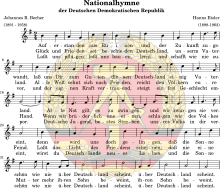Germaniya Demokratik Respublikasi madhiyasi
| Germaniya Demokratik Respublikasi madhiyasi | |
 | |
| Soʻz muallif(lar)i | Johannes Becher |
|---|---|
| Bastakor | Hanns Eisler |
| Qabul qilindi | 1949-yil 14-noyabr |
| Bekor qilindi | 1990-yil 3-oktyabr |
"Auferstanden aus Ruinen" (inglizcha: „Risen from Ruins“, literal: 'Resurrected out of Ruins') nemis vatanparvarlik qoʻshigʻi boʻlib, 1949-yildan 1990-yilgacha Sharqiy Germaniyaning davlat madhiyasi boʻlgan.
Tarix[tahrir | manbasini tahrirlash]
1949-yilda Ittifoqchilar tomonidan bosib olingan Germaniyaning Sovet istilo zonasi „Germaniya Demokratik Respublikasi“ (GDR) nomi ostida sotsialistik davlatga aylandi. Yangi paydo boʻlgan davlatning milliy madhiyasi uchun soʻzlarni keyinchalik Sharqiy Germaniya madaniyat vaziri boʻlgan shoir Johannes Becher yozgan. Ikki musiqachi Ottmar Gerster va Hanns Eisler Becherning soʻzlariga musiqa taklif qilishdi va Hanns Eisler versiyasi tanlab olindi[1].
1949-yilda yozilgan Sharqiy Germaniya milliy madhiyasi nemislarning boʻlinishining dastlabki bosqichlarini aks ettiradi, bunda ishgʻol zonalarini birlashtirish yoʻlidagi davom etayotgan taraqqiyot koʻpchilik nemislar tomonidan oʻrinli va tabiiy deb hisoblangan. Binobarin, Johannes Becher lirikasi „birlik“ning bir qancha maʼnolarini uygʻunlashtiradi va ularni „ota yurt“ (einig Vaterland) yaʼni butun Germaniya bilan birlashtiradi. Biroq, bu konsepsiya tez orada rivojlana boshlagan Sovuq urush kontekstiga toʻgʻri kelmadi. Ayniqsa, 1961-yilda Sharqiy Germaniya hukumati tomonidan Berlin devori qurilganidan keyin, umumiy maqsadda boʻlinish yuz berdi.
1973-yil sentyabr oyida Sharqiy va Gʻarbiy Germaniya bir vaqtning oʻzida Birlashgan Millatlar Tashkilotiga qabul qilindi, ikki hukumat oʻrtasidagi muzokaralar natijasida bir-birini tan olish darajasiga erishildi. Keyinchalik Sharqiy Germaniya konstitutsiyasidan Germaniya atamasi olib tashlandi va rasmiy marosimlarda faqat davlat madhiyasi kuylandi[2]. Becherning norasmiy qoʻllanilgan qoʻshigʻi oʻrniga hech qachon yangi qoʻshiq yozilmagan, ayniqsa 1989-yil oxirida Wende vafot etganidan keyin mamlakatlar haqiqatda birlashish sari intilayotgani maʼlum boʻlgach, Sharqiy Germaniya televideniyesi Deutscher Fernsehfunk asarni tikladi[3].
„Auferstanden aus Ruinen“ 1990-yilda Germaniyaning qayta birlashishi natijasida Germaniya Demokratik Respublikasi tarqatib yuborilgan va uning shtatlari Germaniya Federativ Respublikasi tarkibiga qoʻshilgach, milliy madhiya boʻlishni toʻxtatdi. 1841-yilda yaratilgan „Deutschlandlied“ birlashgan davlat madhiyasiga aylandi. Sharqiy Germaniya Bosh vaziri Lothar de Maizière Becherning soʻzlarini birlashgan Germaniya milliy madhiyasiga qoʻshishni taklif qilgan edi, biroq bu uning Gʻarbiy Germaniya kansleri Helmut Kohl tomonidan rad etildi[4].
Matn[tahrir | manbasini tahrirlash]
| Nemis tilida | Inglizcha tarjima | Poetik tarjima |
|---|---|---|
1. Auferstanden aus Ruinen |
1. Risen from the ruins |
1. From the ruins risen newly, |
Manbalar[tahrir | manbasini tahrirlash]
- ↑ „East Germany (GDR) – Auferstanden aus Ruinen“. NationalAnthems.me. Qaraldi: 2011-yil 2-noyabr.
- ↑ Hymne der DDR at LeMO (Wayback Machine saytida 5 July 2009 sanasida arxivlangan)
- ↑ "Auferstanden aus Ruinen" YouTubeda, Deutscher Fernsehfunk
- ↑ „Neuer Vorschlag: "Auferstanden aus Ruinen" in Nationalhymne?“. Rheinische Post (2010-yil 21-avgust). 2019-yil 27-aprelda asl nusxadan arxivlangan. Qaraldi: 2021-yil 3-fevral.
